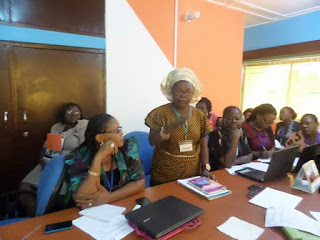In recent months, there have been an upsurge in the number of women dying at traditional birth attendant homes and prayer houses. Furthermore, at the end of MDGs in 2015, Nigeria as a country did not significantly reduce maternal mortality but rather there was a marginal increase. CRS still have over 50% of its women delivering with unskilled birth attendants
One of the key goals of the health sector in Cross River State led the Hon. Com. For Health Dr. Inyang Asibong is to see that maternal mortality and morbidity is reduced to the barest minimum through the increase in skilled birth attendance. In pursuance to this, Director General of Cross River State Primary Healthcare Development Agency, Dr Betta Edu earlier on today flagged-off the committee meeting on development of guidelines for traditional birth attendant operation in Cross River State.
The meeting which was facilitated and hosted by United Nations Population Fund (UNFPA) had in attendance, Mrs Bassey Duke, TBA President in Cross River State and serveral other TBAs from north, central and southern senetorial district, Dr Kenneth Ehouzou, Head of UNFPA CRS, Dr Ikpeme, Head of E.U SIGN CRS, Dr Rajesh Kapse, Director of PHC, Tulsi Chanrai Foundation, Mrs Yemisi Pius, State Program Manager of Pathfinders International and Dr. Ana and Dr Iwara which are Directors from CRSPHCDA and other members of CRSPHCDA which are members of the TBA Survellance team.
Speaking, Dr Betta Edu said Nigeria and CRS is far from the ideal picture seen in many other countries as it concerns the reduction of maternal mortality and morbidity. She noted that the present administration of Senator (Prof) Ben Ayade and his dear wife Dr Linda Ayade working with the health team are determined to reduce maternal mortality in the state and create an enabling environment for pregnant women to deliver safely at health facilities instead of traditional birth attendant houses or prayer houses.
“A critical gap has been identified, a week does not go by without report of death of our women in the TBA homes. Unless immediate steps are taken to regulate the activities of TBAs in the state, we can not make any meaningful progress in reducing matetnal mortality”.
This is the reason why our development partners are collaborating with the agency to streamline the activities of TBA’s in the state and present them with a guideline that will checkmate their excesses.
This guidelines as identified by the erudite and energetic DG, will reflect the community policing innovative intervention of the Her Excelleny Dr. Linda Ayade targeted at reducing Maternal Mortality, it will involve creating community champion from TBAs that adhered to the guidelines. The referral process will have reward and incentives for TBA’s with the highest referral. She tasked the TBA’s to work for the success of the project which will improve the image of the state . She said the committee which includes TBA’s representatives will come up with an acceptable guidelines that will guide their operations henceforth.
Earlier speaking, Kenneth Ehouzou, Head of UNFPA CRS and the chief host said UNFPA under Dr Rati N. as country head is very happy to partner with CRS to streamline the activities of TBA’s with the development of guidelines and code of conduct to guide TBA’s across the state. He assured the DG that as “developmental partners they will continue to provide available resources to support the work of the state Governor, Prof Ben Ayade in reducing maternal mortality in Cross River.
Reacting, TBA president in the state, Deaconess Bassey Duke, said she was happy with this development and she is ready to follow the team even to churches to stop women from delivering with unskilled birth attendants. However, she said age limitation should not be part of the guidelines because most of them were chosen by God to do the work and are still capable beyond 60 years of age.
“We are happy for this meeting, we give our sincere gratitude to CRSG for not trying to eliminate us all, but rather checkmating our activities and giving us new roles in the communities. We appreciate the DG of State Primary Healthcare Agency, Dr Betta Edu and UNFPA for their support. We will work towards the success of these process said, Mrs Egbodor Victoria, TBA woman from Wanihem Ward, Yala LGA.
The committee is expected to come out with the final draft of the guidelines for immediate implementation in the couple of days.
From Prince Charles, Personal Assistant on Media at Department of Primary Health Care Development



